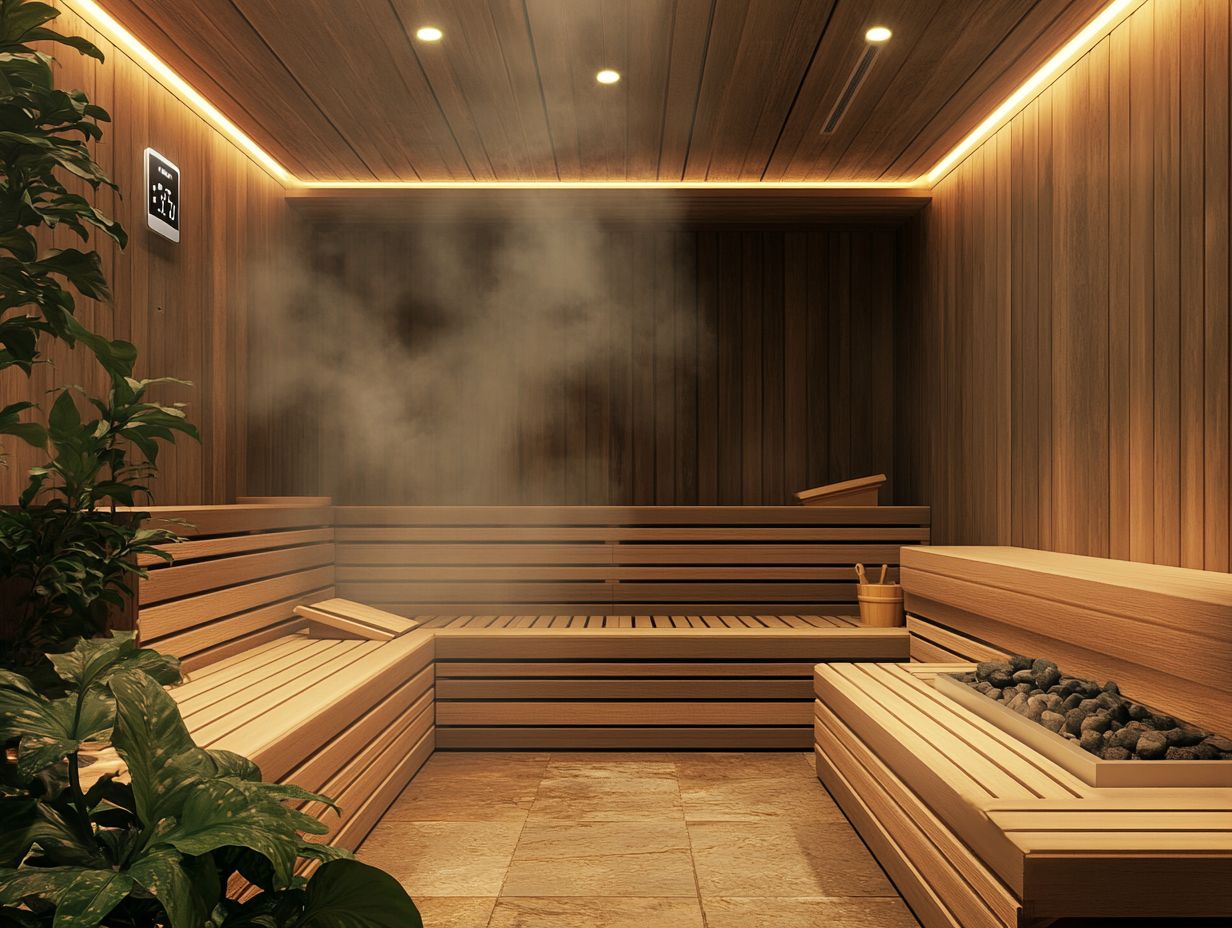Sauna Safety: What Health Professionals Recommend
Saunas have been revered for their remarkable ability to promote relaxation and rejuvenation. Understanding their use and safety is essential for anyone looking to indulge in this experience.
This article delves into what a sauna truly is, examining the myriad benefits and potential risks linked with regular use and vital safety guidelines to keep in mind.
It also sheds light on how saunas can impact your health and provides tailored recommendations for those with specific health conditions.
Whether you re a seasoned sauna enthusiast or just starting to explore this tranquil world of sauna bathing, this guide will help you enjoy your sauna experience safely and effectively.
Contents
Key Takeaways:

- Before using a sauna, consult your doctor if you have health conditions or are pregnant. Safety precautions and proper preparation are crucial for a safe sauna experience.
- Saunas offer many health benefits, but they also come with potential risks such as dehydration and overheating. Listen to your body and take breaks as needed to ensure a safe and enjoyable sauna session.
- Saunas may not be suitable for everyone, especially those with certain health conditions such as heart disease or low blood pressure. Follow expert recommendations and warnings to avoid any potential harm to your health.
Understanding Sauna Use and Safety
Sauna bathing is a popular practice in Finland known for its health benefits. However, it s essential to grasp its usage and safety protocols to fully reap its rewards while minimizing any potential health risks.
Incorporating sauna sessions into your routine can enhance the process of removing toxins from the body, boost cardiovascular health, and serve as a wonderful relaxation therapy. Consider certain factors, especially if you have recent injuries, are elderly, or have pre-existing health conditions.
Consulting with a medical professional and following hydration guidelines will be key to ensuring that your sauna experience is both safe and effective, particularly concerning fluid loss.
What is a Sauna?
A sauna is your personal oasis, a compact room or building tailored for indulging in dry or wet heat sessions. You can choose between traditional saunas and modern infrared options, both steeped in Finnish heritage.
For centuries, the sauna has been a cornerstone of Finnish culture, serving not just as a relaxation spot but as a vibrant social hub where friends and families come together to connect. In traditional saunas, hot stones and steam create a high-temperature environment that encourages sweating and deep relaxation.
Infrared saunas utilize cutting-edge technology to emit heat that warms your body directly rather than the surrounding air, offering a more comfortable experience at lower temperatures.
Each sauna type presents its own unique benefits, catering to your individual preferences and wellness goals, whether you re looking to detoxify or simply unwind and relieve muscle tension.
Sauna Benefits and Risks
While you may revel in the myriad health benefits of sauna use such as enhanced cardiovascular health and detoxification it is imperative to remain vigilant about the potential risks linked to excessive sessions or inadequate hydration.
Regular sauna visits can markedly improve your cardiovascular performance by promoting optimal blood flow and supporting heart health, which is why so many fitness enthusiasts gravitate toward this practice. The sweat you produce during a sauna session works wonders, helping to purge toxins from your body and leaving you with a refreshed feeling.
However, it s essential to keep in mind that sauna use can lead to dehydration and may heighten heat sensitivity for some individuals. A balanced approach ensuring you stay well-hydrated and attuned to your body s signals will allow you to fully enjoy the many benefits of sauna therapy without the drawbacks.
Ready to relax? Let s dive into the world of saunas safely!
Sauna Safety Guidelines

Sauna safety guidelines are essential for ensuring that you have a rewarding experience, especially if you re an elderly individual or someone with pre-existing health conditions.
Taking the right precautions and preparing adequately before stepping into the sauna is vital for your well-being. This can help prevent serious issues like heart attack.
Precautions and Preparations
Before you indulge in a sauna session, taking the right precautions and preparations is crucial to elevate your experience. This helps minimize any risks related to recent injuries or injuries.
Proper hydration is key, as the heat can lead to significant fluid loss through sweating. Aim to drink water or an electrolyte-rich beverage at least 30 minutes before you enter the sauna.
If you re elderly or have any existing health conditions, such as diabetes or cardiovascular disease, always check with your doctor first! Those high temperatures might pose risks like overheating or dehydration.
This extra attention to detail ensures your sauna becomes a true sanctuary of relaxation, promoting wellness and enjoyment rather than discomfort or danger.
Health Considerations for Sauna Use
Health considerations for sauna use are crucial, particularly for those with existing health issues like cardiovascular diseases or diabetes. While sauna therapy can provide notable therapeutic benefits, it s essential to approach it with caution.
Effects on the Body and Potential Risks
Sauna bathing offers a range of effects on your body, providing valuable benefits like pain relief and relaxation. However, it s equally important to be aware of potential health risks, such as fluid loss and heat sensitivity.
As your body encounters elevated temperatures, your heart rate increases significantly often mirroring levels you d experience during moderate exercise. This boost in heart rate enhances blood circulation, allowing oxygen and nutrients to be delivered more efficiently throughout your system.
Sauna use helps your body get rid of toxins through sweat. It’s essential to recognize the risks associated with excessive heat exposure, which may include dehydration, heat exhaustion, and the worsening of pre-existing medical conditions.
By practicing mindfulness and moderation, especially with regards to prescription drugs and hydration, you can maximize the benefits of sauna bathing while minimizing any potential hazards.
Sauna Use for Specific Health Conditions

You can customize your sauna experience to deliver therapeutic benefits for various health conditions, including cardiovascular issues, diabetes, chronic pain, and neurocognitive disease.
It’s essential to follow expert recommendations and heed warnings about temperature regulation to ensure a safe and effective practice.
Expert Recommendations and Warnings
Expert recommendations and warnings are essential for anyone considering sauna use for health benefits, especially if you have problems with the heart and blood vessels or other medical conditions that require careful attention.
Before you immerse yourself in sauna sessions, it s wise to consult with healthcare professionals. You should consult with healthcare professionals before using saunas for health benefits. Sauna use can promote relaxation and offer benefits such as enhanced circulation and muscle relaxation. However, it can also carry risks.
If you have hypertension, diabetes, or respiratory issues, it s crucial for you to assess how sauna use might affect your health. Experts recommend monitoring your heart rate and hydration levels during your time in the sauna. Pre-existing conditions could complicate the experience.
Consulting a medical expert not only provides you with personalized guidance but also ensures that your sauna experience is both safe, particularly for those with heart attack concerns, and enjoyable.
Frequently Asked Questions
What is the recommended time limit for using a sauna?
Health professionals typically recommend a sauna session to last no longer than 15-20 minutes.
Are there any health conditions that may prevent someone from using a sauna?

Yes, individuals with heart disease, low blood pressure, or pregnant women should consult with their doctor before using a sauna.
Is it safe to use a sauna while taking medication?
It is best to consult with a doctor before using a sauna while on any medication, as some medications may have adverse reactions to heat exposure.
What precautions should be taken before entering a sauna?
Before entering a sauna, it is important to drink plenty of water and avoid consuming alcohol. It is also recommended to take a shower beforehand to remove any lotions or oils from the skin.
Can children use a sauna?
Children under the age of 12 should not use a sauna, as their bodies are not fully developed to regulate heat. It is always best to consult with a pediatrician before allowing a child to use a sauna.
How often should one use a sauna?
The frequency of sauna use depends on individual health and tolerance, which can vary based on health conditions such as hypertension or diabetes. It is generally recommended to use a sauna, including traditional saunas and infrared saunas, no more than 2-3 times a week, with at least one day of rest in between sessions to ensure proper hydration and avoid health risks.






